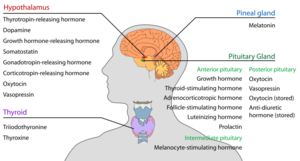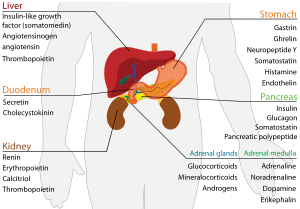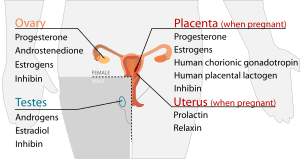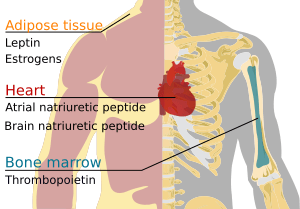Endocrine system facts for kids
The endocrine system is like your body's secret messaging service! It's made up of special glands and organs that create and release chemicals called hormones. These hormones travel through your bloodstream to different parts of your body. They help control many important things. This includes how your body uses food (your metabolism), how you grow and develop, and even your mood.
Think of hormones as tiny messengers. They tell your body what to do and when to do it. For example, some hormones help you grow tall, while others help you feel hungry or sleepy.
The endocrine system is different from your nervous system. The nervous system sends super-fast messages using nerves. The endocrine system sends slower messages using hormones, but their effects can last a long time.
Endocrine glands are special because they release their hormones directly into your blood. They don't use tubes or ducts like some other glands.
Contents
Main Endocrine Glands and Their Hormones
Your body has many important endocrine glands. Each one makes specific hormones that do different jobs.
Brain Glands
- Hypothalamus
- This part of your brain controls the pituitary gland. It makes hormones that tell the pituitary when to release its own hormones.
- Pineal body
- This tiny gland makes Melatonin. Melatonin helps control your sleep and wake cycles. It's why you feel sleepy at night!
- Pituitary gland
- The pituitary gland is often called the "master gland." It's small, about the size of a pea, but it controls many other glands.
- Front part (Anterior pituitary)
- It makes Growth hormone (GH), which helps you grow.
- It also makes hormones that control your thyroid, adrenal glands, and reproductive organs.
- Back part (Posterior pituitary)
- This part stores and releases hormones made by the hypothalamus. These include Oxytocin (important for social bonding) and Vasopressin (which helps your body manage water).
Thyroid Gland
- Thyroid
- This gland is in your neck. It makes thyroid hormones like Thyroxine (T4) and Triiodothyronine (T3).
- These hormones control your metabolism. They affect how your body uses energy.
- The thyroid also makes Calcitonin, which helps control the amount of calcium in your blood.
Glands in Your Digestive System
- Stomach
- Your stomach makes hormones like Gastrin and Ghrelin. Gastrin helps with digestion, and Ghrelin tells your brain when you're hungry.
- Duodenum
- This is the first part of your small intestine. It makes hormones like Cholecystokinin, which helps with food digestion.
- Liver
- Your liver makes important hormones like Insulin-like growth factor (IGF). This hormone helps with growth and development.
- Pancreas
- The pancreas is a very important gland. It makes two main hormones:
- Insulin: This hormone helps your body use sugar (glucose) for energy. It lowers blood sugar levels.
- Glucagon: This hormone does the opposite of insulin. It raises blood sugar levels when they get too low.
- The pancreas is a very important gland. It makes two main hormones:
Kidney Glands
- Kidney
- Your kidneys make hormones too!
- Renin helps control your blood pressure.
- Erythropoietin (EPO) tells your bone marrow to make more red blood cells.
- Calcitriol is the active form of vitamin D. It helps your body absorb calcium.
Adrenal Glands
- Adrenal glands
- You have two adrenal glands, one on top of each kidney.
- Outer part (Adrenal cortex)
- This part makes Glucocorticoids (like cortisol). These help your body handle stress and control metabolism.
- It also makes Mineralocorticoids (like aldosterone), which help balance salt and water in your body.
- Inner part (Adrenal medulla)
- This part makes Adrenaline (epinephrine) and Noradrenaline (norepinephrine). These are your "fight or flight" hormones. They prepare your body for sudden stress or danger.
Reproductive System Glands
Male Reproductive Glands
- Testes
- In males, the testes make Androgens, mainly testosterone. Testosterone is important for male development and characteristics.
Female Reproductive Glands
- Ovaries
- In females, the ovaries make Oestrogens (like oestradiol) and Progesterone. These hormones are key for female development, the menstrual cycle, and pregnancy.
- Placenta
- During pregnancy, the placenta (the organ that connects the mother to the baby) makes many hormones. These include Progesterone, Oestrogens, and Human chorionic gonadotropin (HCG). These hormones are vital for a healthy pregnancy.
- Uterus
- During pregnancy, the uterus also makes hormones like Prolactin and Relaxin.
Calcium Regulation Glands
- Parathyroid
- These tiny glands are behind your thyroid. They make Parathyroid hormone (PTH). PTH works with calcitonin (from the thyroid) to control calcium levels in your blood.
- Skin
- Your skin makes Vitamin D3 when exposed to sunlight. Vitamin D is important for strong bones because it helps your body use calcium.
Other Important Glands
- Heart
- Your heart makes hormones like Atrial-natriuretic peptide (ANP). These hormones help control blood pressure and fluid balance.
- Adipose tissue
- This is your body fat. It makes hormones like Leptin, which helps control your appetite and how much energy your body uses.
- Bone marrow
- Your bone marrow makes Thrombopoietin. This hormone helps your body produce platelets, which are important for blood clotting.
Other pages
See also
 In Spanish: Sistema endocrino para niños
In Spanish: Sistema endocrino para niños
 | William Lucy |
 | Charles Hayes |
 | Cleveland Robinson |





